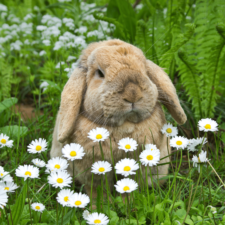iAs you may know, here at Pendleton Veterinary Clinic, we have a soft spot for large dogs. Of course, Fido isn’t the only pet that sometimes comes supersized. Bunnies also come in extra large! An Anderson, IN discusses giant rabbits below.
Giant Bunnies
The Flemish Giant is likely the most popular giant bunny, probably because they tend to be very sweet and docile. Other large breeds include the Continental Giant, Spanish Giant, Hungarian Giant, Checkered Giant, Blanc de Bouscat, French Lop, and Silver Fox. These are all a bit different, so do plenty of research before adopting one.
Size
Most bunnies are fairly small, so you may be surprised to realize how big Floppy can get. Giant rabbits can weigh over 15 pounds! (In comparison, most pet rabbits weigh less than 6 pounds.) As with dogs, big rabbits have shorter lifespans than small ones, and typically only live about 4 to 6 years.
Housing
Floppy’s basic needs are the same as those of regular-sized rabbits. However, you’ll need to supersize everything … especially her habitat. Large rabbits need much more room than the typical pet store cage or hutch can accommodate. You may want to keep your not-so-little buddy in a shed or aviary. Your furry friend will also benefit from having some outdoor room—at least 20 square feet—for foraging and grazing.
Handling
Bunnies can be quite lovable, but many don’t care to be held. They also aren’t as comfortable being on humans’ laps as cats or small dogs. With big rabbits, this means that it can be difficult to hold Floppy when you need to. These guys can cause serious injuries if they kick you! You will need to handle your furry friend for things like nail trims and health checks. We recommend sitting down for this when possible. Ask your vet for more information.
Feeding
Like smaller rabbits, giant bunny diets should consist mostly of fresh grass hay. Floppy will also need some leafy greens, as well as small amounts of commercial food. Ask your vet for specific advice.
Health Care
Big bunnies are prone to some specific health conditions, such as arthritis and pododermatitis, or sore hocks, as they are commonly called. Heart problems and flystrike are also not uncommon. Watch for warning signs, and keep up with your pet’s veterinary care.
As your Anderson, IN veterinary clinic, we’re here to help. Call us anytime!









